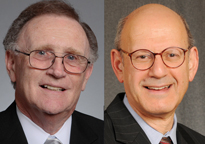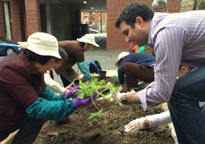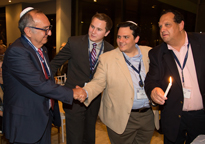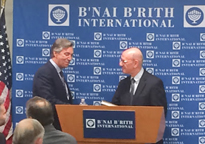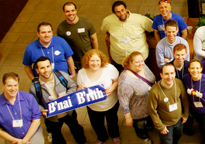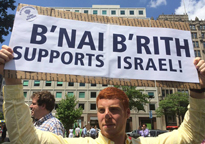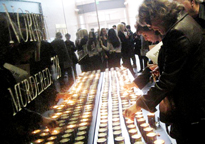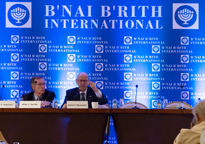We are a globally recognized leader in the fields of senior housing and aging. B’nai B’rith has been a solid advocate for seniors in the United States for decades. We regularly meet with lawmakers to discuss the unique plight of the elderly in the United States and around the world. We speak out against legislation that could harm the often vulnerable senior population. We teach leaders at our low-income senior housing facilities practical lessons in such topics as suicide prevention and bullying prevention.
Access for low-income seniors to safe and affordable housing is one of our main organizational priorities, and what we have learned from more than 40 years in the field has shaped the rest of our aging policy agenda.
B’nai B’rith is the largest national Jewish sponsor of low-income housing for seniors in the United States, with 42 buildings in 26 communities. We also sponsor six buildings located in Toronto, Montreal and Vancouver, Canada, as well as additional facilities around the world. In the United States, with funding from the U.S. Department of Housing and Urban Development (HUD), we provide safe, affordable housing for more than 8,000 seniors of limited income without regard to race, national origin or religion. In order to fulfill our mission and standards of operations for each building, B’nai B’rith staff provides ongoing training, troubleshooting, programming and advocacy outreach for the entire housing network. Local B’nai B’rith volunteers provide guidance to buildings in their communities.
In Congress, we strongly advocate for housing funds, aiming to stop further cuts.
Access for low-income seniors to safe and affordable housing is one of our main organizational priorities, and what we have learned from more than 40 years in the field has shaped the rest of our aging policy agenda.
B’nai B’rith is the largest national Jewish sponsor of low-income housing for seniors in the United States, with 42 buildings in 26 communities. We also sponsor six buildings located in Toronto, Montreal and Vancouver, Canada, as well as additional facilities around the world. In the United States, with funding from the U.S. Department of Housing and Urban Development (HUD), we provide safe, affordable housing for more than 8,000 seniors of limited income without regard to race, national origin or religion. In order to fulfill our mission and standards of operations for each building, B’nai B’rith staff provides ongoing training, troubleshooting, programming and advocacy outreach for the entire housing network. Local B’nai B’rith volunteers provide guidance to buildings in their communities.
In Congress, we strongly advocate for housing funds, aiming to stop further cuts.
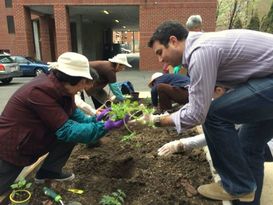
The annual B’nai B’rith International Conference on Senior Housing, which brings together members of the various boards of directors and management professionals of the buildings for three days of training, was held this year in Hot Springs, Ark., in October. After hearing from experts on the state of funding for affordable senior housing in the United States, participants focused on expanding volunteer networks and the future of affordable housing.
B’nai B’rith also hosted a three-day training session for our property managers and service coordinators this summer in Chicago. A featured topic was how the B’nai B’rith Young Leadership Network can provide programming events in the senior housing buildings. Attendees learned how to apply for financial grants and assistance to help develop service programs. And they dealt with issues of fair housing—ensuring that buildings are in compliance with laws pertaining to potential discrimination.
B’nai B’rith also hosted a three-day training session for our property managers and service coordinators this summer in Chicago. A featured topic was how the B’nai B’rith Young Leadership Network can provide programming events in the senior housing buildings. Attendees learned how to apply for financial grants and assistance to help develop service programs. And they dealt with issues of fair housing—ensuring that buildings are in compliance with laws pertaining to potential discrimination.
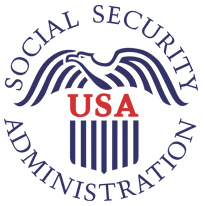
B’nai B’rith helped derail a plan to cut the Social Security Cost-of-Living Adjustment that would have affected all current and future beneficiaries. Our vigilance on this issue does not wane. We are leading the fight to stop the Social Security Administration from eliminating several key services from their field offices. We persuaded Social Security to keep the services and work with us on ways to make it easier to supply information to people who need it.
We are leading the effort to restore the paper mailing of the annual earnings statement from Social Security to all Americans. This mailing allows people to correct mistakes in time to help them ensure their benefits are fully realized. The paper mailing also helps people understand the benefits social security provides to workers and their families in the event of retirement, disability and death. Social Security will now mail them out to people on their “big birthdays” every five years. We continue to work with the Social Security Administration on getting back to more frequent statements.
We are leading the effort to restore the paper mailing of the annual earnings statement from Social Security to all Americans. This mailing allows people to correct mistakes in time to help them ensure their benefits are fully realized. The paper mailing also helps people understand the benefits social security provides to workers and their families in the event of retirement, disability and death. Social Security will now mail them out to people on their “big birthdays” every five years. We continue to work with the Social Security Administration on getting back to more frequent statements.

We are working closely with Social Security Administration as it develops “Vision 2025” to make sure that future plans for the agency include quality services to people—especially older adults.
B’nai B’rith worked with both the Social Security Administration and Medicare on fair and clear implementation of the “Windsor decision” that requires the federal government to recognize same sex marriages for federal benefits. Because Social Security bases its decisions on the recognition of marriage in a worker’s state of residence, there are still issues where Americans in different states face different statuses at the federal level.
B’nai B’rith sprang to action when it was revealed that some Nazi war criminals who had sought refuge in the United States in the wake of the Holocaust, and later fled to their countries of origin, were receiving Social Security benefits through a legal loophole, despite having left the country and renounced their U.S. citizenship. We actively supported changing the law to close this loophole and deny Social Security to such individuals. Shortly after bringing the issue to the forefront, the House of Representatives introduced and unanimously passed the No Social Security for Nazis Act. The bill was subsequently passed by the Senate and signed into law by the president. B’nai B’rith is proud to have spurred Congress to quick and decisive action on bipartisan legislation to address this important issue.
We routinely advocate for legislative improvements to programs that benefit low-income persons, including the Social Security program, which provides modest incomes to older adults, many of whom reside in B’nai B’rith-sponsored housing. Many of these residents have no other source of income. As the program hasn't been adjusted for inflation, savings accounts with only a few hundred dollars can disqualify beneficiaries, as well as those who may be living with a relative or accepting other “care giving” from family. This creates an untenable administrative burden for the Social Security Administration, and discourages the kind of family care giving on which the long term care system in this country depends.
B’nai B’rith studies and reacts to each government budget plan to ensure programs for the elderly and low-income people are protected.
As part of B’nai B’rith’s continued programming for residents of B’nai B’rith Senior Housing complexes, we again partnered with Bank of the West to bring an elder fraud prevention workshop to residents, this time at the B’nai B’rith Golden Years Apartments in North Hollywood, Calif. Attendees at the August event heard presentations on some common scams, identity fraud and other types of financial abuse.
B’nai B’rith worked with both the Social Security Administration and Medicare on fair and clear implementation of the “Windsor decision” that requires the federal government to recognize same sex marriages for federal benefits. Because Social Security bases its decisions on the recognition of marriage in a worker’s state of residence, there are still issues where Americans in different states face different statuses at the federal level.
B’nai B’rith sprang to action when it was revealed that some Nazi war criminals who had sought refuge in the United States in the wake of the Holocaust, and later fled to their countries of origin, were receiving Social Security benefits through a legal loophole, despite having left the country and renounced their U.S. citizenship. We actively supported changing the law to close this loophole and deny Social Security to such individuals. Shortly after bringing the issue to the forefront, the House of Representatives introduced and unanimously passed the No Social Security for Nazis Act. The bill was subsequently passed by the Senate and signed into law by the president. B’nai B’rith is proud to have spurred Congress to quick and decisive action on bipartisan legislation to address this important issue.
We routinely advocate for legislative improvements to programs that benefit low-income persons, including the Social Security program, which provides modest incomes to older adults, many of whom reside in B’nai B’rith-sponsored housing. Many of these residents have no other source of income. As the program hasn't been adjusted for inflation, savings accounts with only a few hundred dollars can disqualify beneficiaries, as well as those who may be living with a relative or accepting other “care giving” from family. This creates an untenable administrative burden for the Social Security Administration, and discourages the kind of family care giving on which the long term care system in this country depends.
B’nai B’rith studies and reacts to each government budget plan to ensure programs for the elderly and low-income people are protected.
As part of B’nai B’rith’s continued programming for residents of B’nai B’rith Senior Housing complexes, we again partnered with Bank of the West to bring an elder fraud prevention workshop to residents, this time at the B’nai B’rith Golden Years Apartments in North Hollywood, Calif. Attendees at the August event heard presentations on some common scams, identity fraud and other types of financial abuse.





